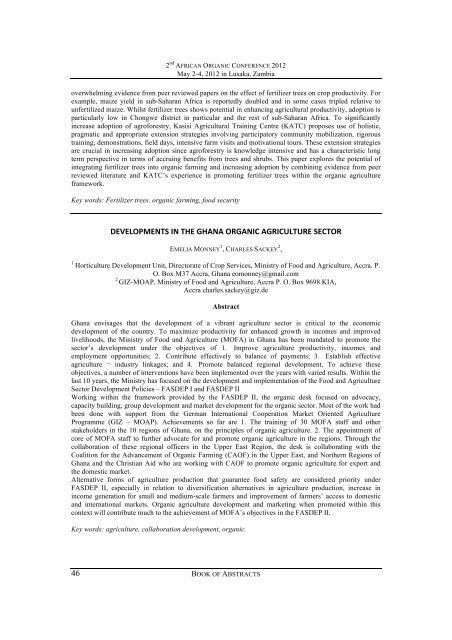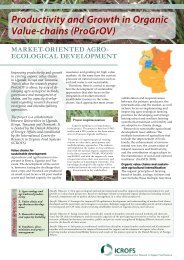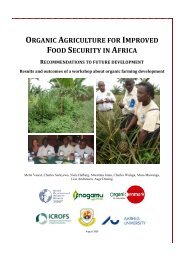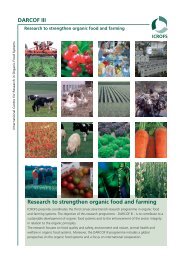The 2nd African Organic Conference â Mainstreaming ... - ICROFS
The 2nd African Organic Conference â Mainstreaming ... - ICROFS
The 2nd African Organic Conference â Mainstreaming ... - ICROFS
You also want an ePaper? Increase the reach of your titles
YUMPU automatically turns print PDFs into web optimized ePapers that Google loves.
2 nd AFRICAN ORGANIC CONFERENCE 2012<br />
May 2-4, 2012 in Lusaka, Zambia<br />
overwhelming evidence from peer reviewed papers on the effect of fertilizer trees on crop productivity. For<br />
example, maize yield in sub-Saharan Africa is reportedly doubled and in some cases tripled relative to<br />
unfertilized maize. Whilst fertilizer trees shows potential in enhancing agricultural productivity, adoption is<br />
particularly low in Chongwe district in particular and the rest of sub-Saharan Africa. To significantly<br />
increase adoption of agroforestry, Kasisi Agricultural Training Centre (KATC) proposes use of holistic,<br />
pragmatic and appropriate extension strategies involving participatory community mobilization, rigorous<br />
training, demonstrations, field days, intensive farm visits and motivational tours. <strong>The</strong>se extension strategies<br />
are crucial in increasing adoption since agroforestry is knowledge intensive and has a characteristic long<br />
term perspective in terms of accruing benefits from trees and shrubs. This paper explores the potential of<br />
integrating fertilizer trees into organic farming and increasing adoption by combining evidence from peer<br />
reviewed literature and KATC’s experience in promoting fertilizer trees within the organic agriculture<br />
framework.<br />
Key words: Fertilizer trees, organic farming, food security<br />
DEVELOPMENTS&IN&THE&GHANA&ORGANIC&AGRICULTURE&SECTOR&<br />
EMELIA MONNEY 1 , CHARLES SACKEY 2 ,<br />
1<br />
Horticulture Development Unit, Directorate of Crop Services, Ministry of Food and Agriculture, Accra. P.<br />
O. Box M37 Accra, Ghana eomonney@gmail.com<br />
2<br />
GIZ-MOAP, Ministry of Food and Agriculture, Accra P. O. Box 9698 KIA,<br />
Accra charles.sackey@giz.de<br />
Abstract<br />
Ghana envisages that the development of a vibrant agriculture sector is critical to the economic<br />
development of the country. To maximize productivity for enhanced growth in incomes and improved<br />
livelihoods, the Ministry of Food and Agriculture (MOFA) in Ghana has been mandated to promote the<br />
sector’s development under the objectives of 1. Improve agriculture productivity, incomes and<br />
employment opportunities; 2. Contribute effectively to balance of payments; 3. Establish effective<br />
agriculture ¬ industry linkages; and 4. Promote balanced regional development. To achieve these<br />
objectives, a number of interventions have been implemented over the years with varied results. Within the<br />
last 10 years, the Ministry has focused on the development and implementation of the Food and Agriculture<br />
Sector Development Policies – FASDEP I and FASDEP II<br />
Working within the framework provided by the FASDEP II, the organic desk focused on advocacy,<br />
capacity building, group development and market development for the organic sector. Most of the work had<br />
been done with support from the German International Cooperation Market Oriented Agriculture<br />
Programme (GIZ – MOAP). Achievements so far are 1. <strong>The</strong> training of 30 MOFA staff and other<br />
stakeholders in the 10 regions of Ghana, on the principles of organic agriculture. 2. <strong>The</strong> appointment of<br />
core of MOFA staff to further advocate for and promote organic agriculture in the regions. Through the<br />
collaboration of these regional officers in the Upper East Region, the desk is collaborating with the<br />
Coalition for the Advancement of <strong>Organic</strong> Farming (CAOF) in the Upper East, and Northern Regions of<br />
Ghana and the Christian Aid who are working with CAOF to promote organic agriculture for export and<br />
the domestic market.<br />
Alternative forms of agriculture production that guarantee food safety are considered priority under<br />
FASDEP II, especially in relation to diversification alternatives in agriculture production, increase in<br />
income generation for small and medium-scale farmers and improvement of farmers’ access to domestic<br />
and international markets. <strong>Organic</strong> agriculture development and marketing when promoted within this<br />
context will contribute much to the achievement of MOFA’s objectives in the FASDEP II.<br />
Key words: agriculture, collaboration development, organic.<br />
46<br />
BOOK OF ABSTRACTS





